When a new, possibly relevant political party forms, the China community naturally asks itself the question: How does this new faction perceive the People’s Republic? Finn Mayer-Kuckuk has looked at what the founders of the German “Alliance Sahra Wagenknecht” – BSW for short – have said about China so far.
What is clear: They want close economic cooperation with the People’s Republic; they consider turning away from business with China unrealistic or even harmful. Wagenknecht herself once directly praised Beijing’s industrial policy. In the Ukraine war, the BSW follows the Sino-Russian narrative, which sees the USA as the warmonger and the root of the escalation.
The sky may soon no longer be the limit in China’s southern metropolis of Shenzhen, and what will take you there is an electric two-seater – with no pilot at all. The company Ehang has received official certification for its first electric vertical take-off model called EH-216. It is the world’s first license of its kind, as Frank Sieren writes. The model has already received 100 orders and will soon be used as an air cab on a number of selected routes.

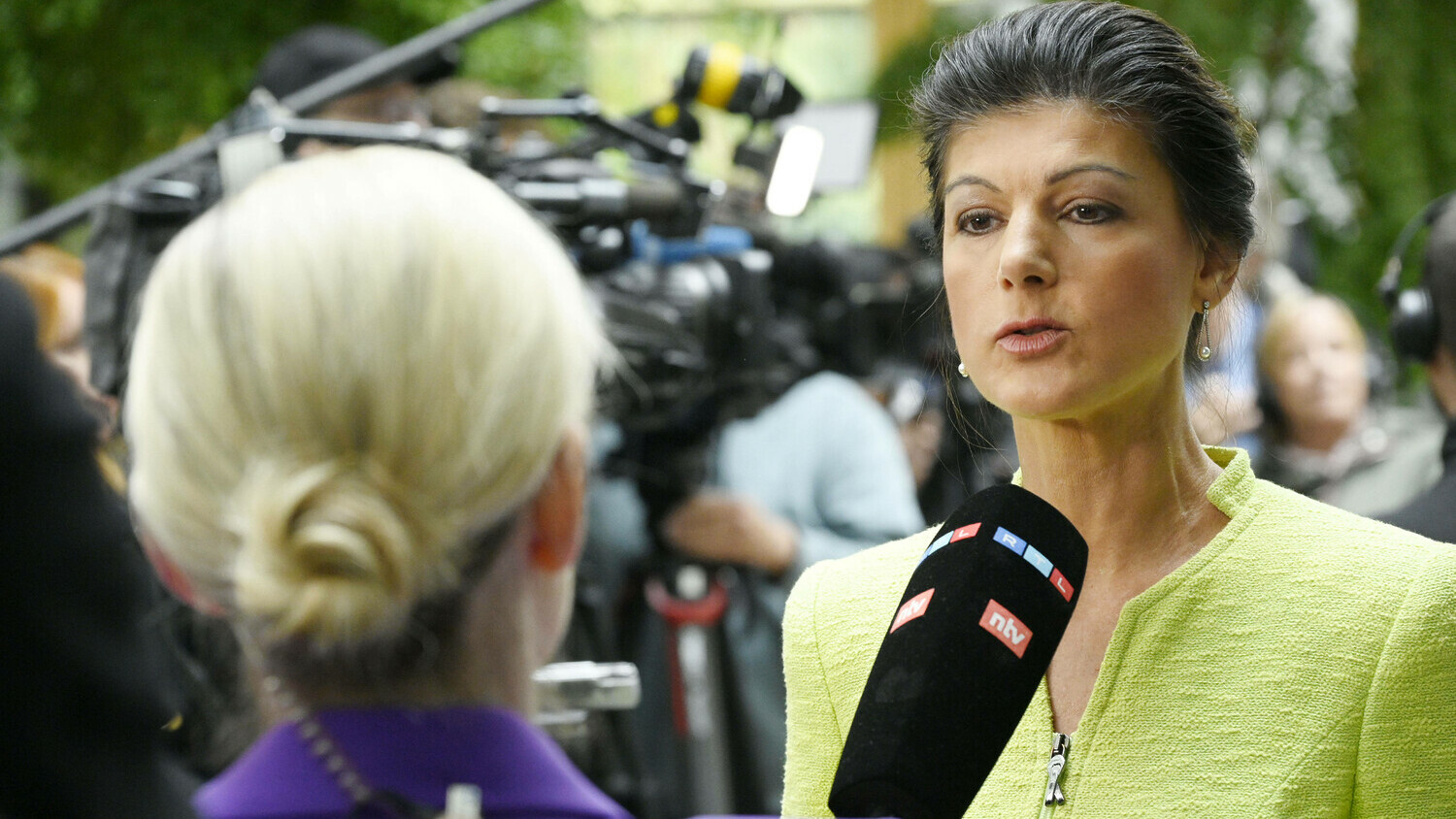
The newly-founded Alliance Sahra Wagenknecht (BSW) does not explicitly mention China in its founding manifesto. But China is at least indirectly mentioned in a similar context as Russia: “We reject the deployment of German soldiers in international wars as well as their stationing on the Russian border or in the South China Sea.”
The paper follows the Sino-Russian narrative, identifying US warmongering as the root of the current conflicts and portraying Germany and the EU as helpless followers of Washington. The alliance generally rejects sanctions.
The BSW aims to work toward an independent EU position: “Our goal is an independent Europe of sovereign democracies in a multipolar world and not a new bloc confrontation in which Europe is ground down between the United States and the increasingly self-confident new power bloc around China and Russia.”
The BSW’s worldview is in line with Beijing’s repeated recommendation that the EU should free itself from the grip of the USA. And go its own way – towards China, if possible. France’s President Emmanuel Macron has already expressed a similar view and received plenty of criticism from Berlin and Brussels.
However, it is also remarkable that the Wagenknecht Alliance recognizes that the “power bloc around China” is forming “increasingly self-confident.” This reflects reality, even if the BSW conclusion differs from the majority position in the German government. Instead of confrontation, the BSW seeks peace negotiations, “détente, reconciliation of interests, and international cooperation.” By its own admission, it sees itself in the tradition of the former chancellor of West Germany, Willy Brandt.
The project’s initiator, Sahra Wagenknecht, has expressed similar positions on China in the past. “As robust as the Chinese economy may be, trade relations with the East Asian country are fragile. There are dangers here, in particular, if Europe fails to make itself independent of the American economic wars,” she wrote three years ago.
Wagenknecht presents China as a model of successful economic policy during the pandemic: “Incidentally, the fact that China is the only major economy to grow this year has one central cause: A determined industrial policy and massive state investment.” So, Wagenknecht is a fan of industrial policy.
“BSW – Fuer Vernunft und Gerechtigkeit” (For Reason and Justice) is a spin-off from the German Left Party, which opposes taking in refugees and favors cheap Russian gas imports. The leading figure is the high-profile member of the German Bundestag Wagenknecht. So far, BSW is only a registered association, but there are plans to found a new party. The association’s chairwoman is Amira Mohamed Ali, a member of the Bundestag from Hamburg.
Mohamed Ali has also commented extensively on China. Her views are largely in line with Wagenknecht’s. Mohamed Ali also sees the growing relationship between China and Russia not as a positive development, but as a threat. “The danger of a powerful bloc consisting of Russia, China, India and Iran, which can marginalize the EU and the US economically and geopolitically, is growing.”
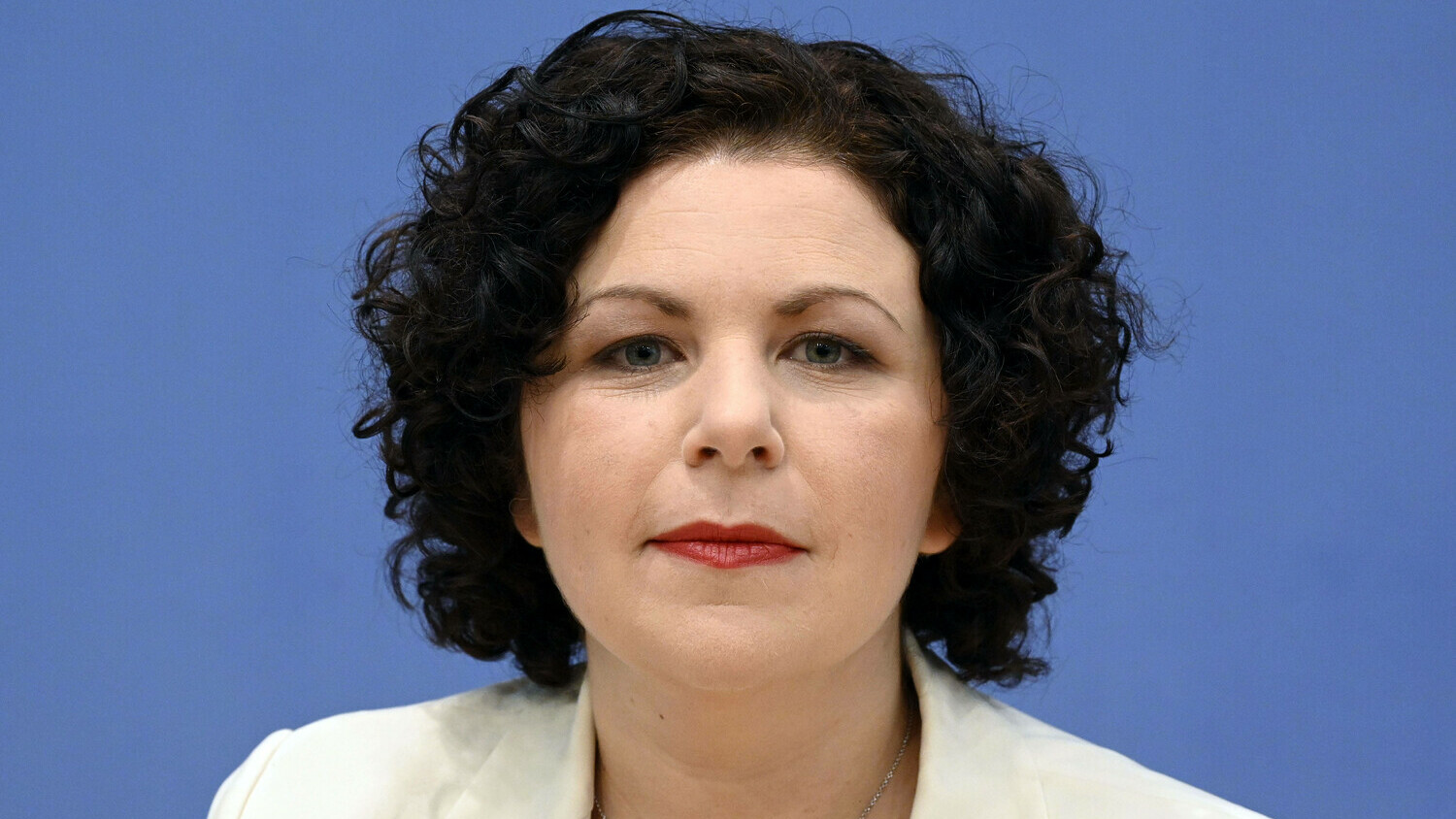
At the time, she praised Chancellor Olaf Scholz for seeking talks with Beijing to bring peace to Ukraine. In contrast, Mohamed Ali criticized the German Green Party on Twitter, saying, “If the Green anti-China course prevails, our economy will collapse further. Jobs disappear, purchasing power drops rapidly.”
However, the new BSW chairwoman also acknowledges that “China is not a democratic state. It is true that serious human rights violations are commonplace there.” However, she feels that Washington influences the German debate: “The reason why human rights violations in China are such an issue now is the fact that the competitive situation between the US and China has intensified in terms of who is or will become the world’s number one power.”
Mohamed Ali considers the values-driven policy of Green Foreign Minister Annalena Baerbock to be futile: “Anyone who believes that the human rights situation in China will improve by Europe sealing itself off from China is simply mistaken.” She firmly advocates good economic relations with China: “An economic war with China would have devastating consequences for our country. Countless jobs would be at risk. That is the wrong course.”
German MP Christian Leye, also one of the co-founders of BSW, has commented extensively on China recently. He is particularly keen to avoid a trade policy confrontation.
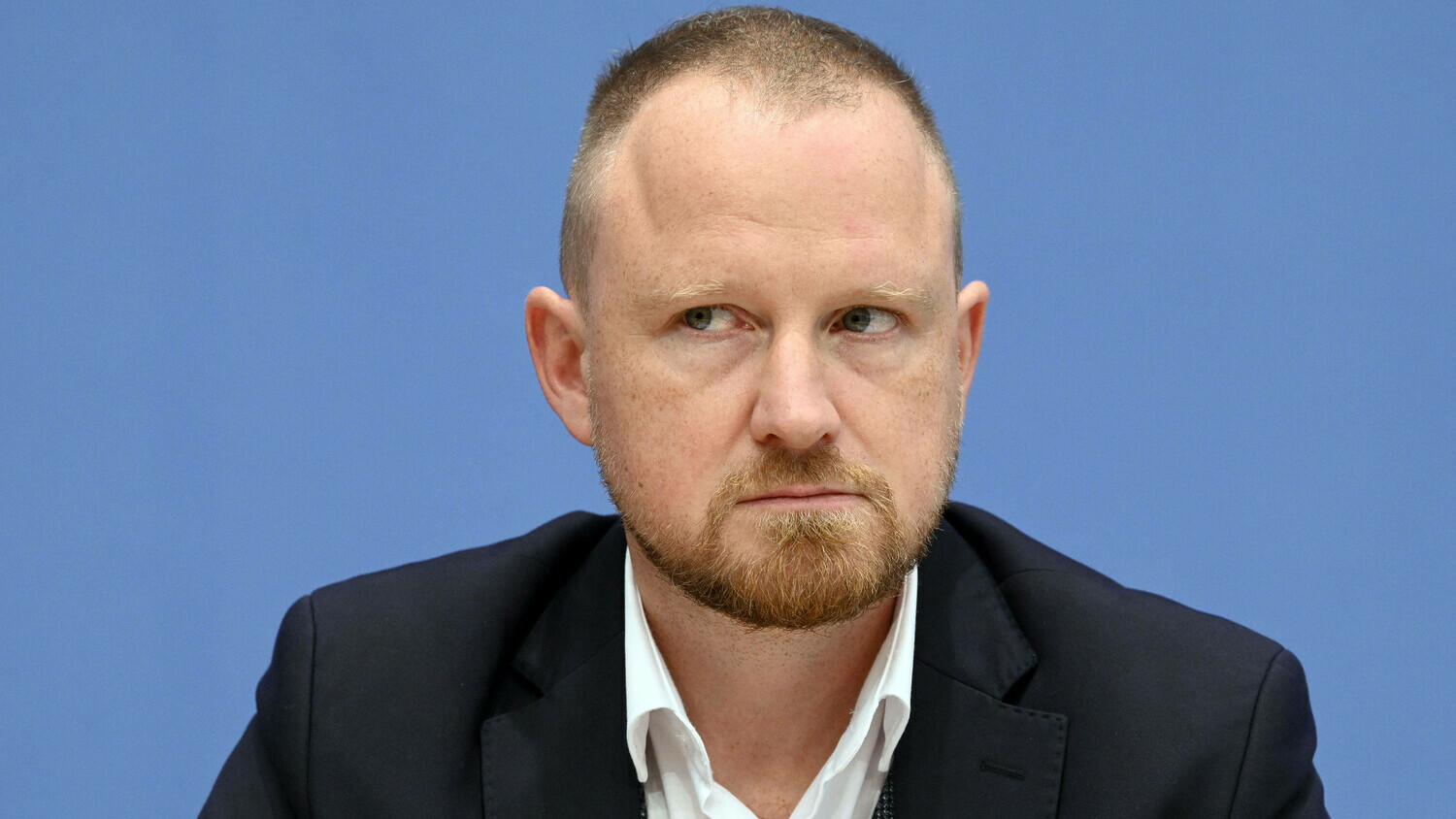
He noted that because of Germany’s heavy dependence on China, particularly for raw materials, it could not afford to be involved in a dispute. “We would be well advised to keep our hands off another economic war, this time with China,” Leye said last year. “Another trade conflict, this time tougher and worse than the one with Russia; the population will not go along with that; they can’t stand it, ladies and gentlemen.”
In June 2023, Leye submitted a minor interpellation to the German Bundestag, inquiring about the status of export guarantees for business with China. In response to the MP’s question, the Ministry of Economics stated that only a few projects were still guaranteed with small sums. Leye then criticized Economy Minister Robert Habeck, saying that his anti-China stance jeopardized Germany’s success.
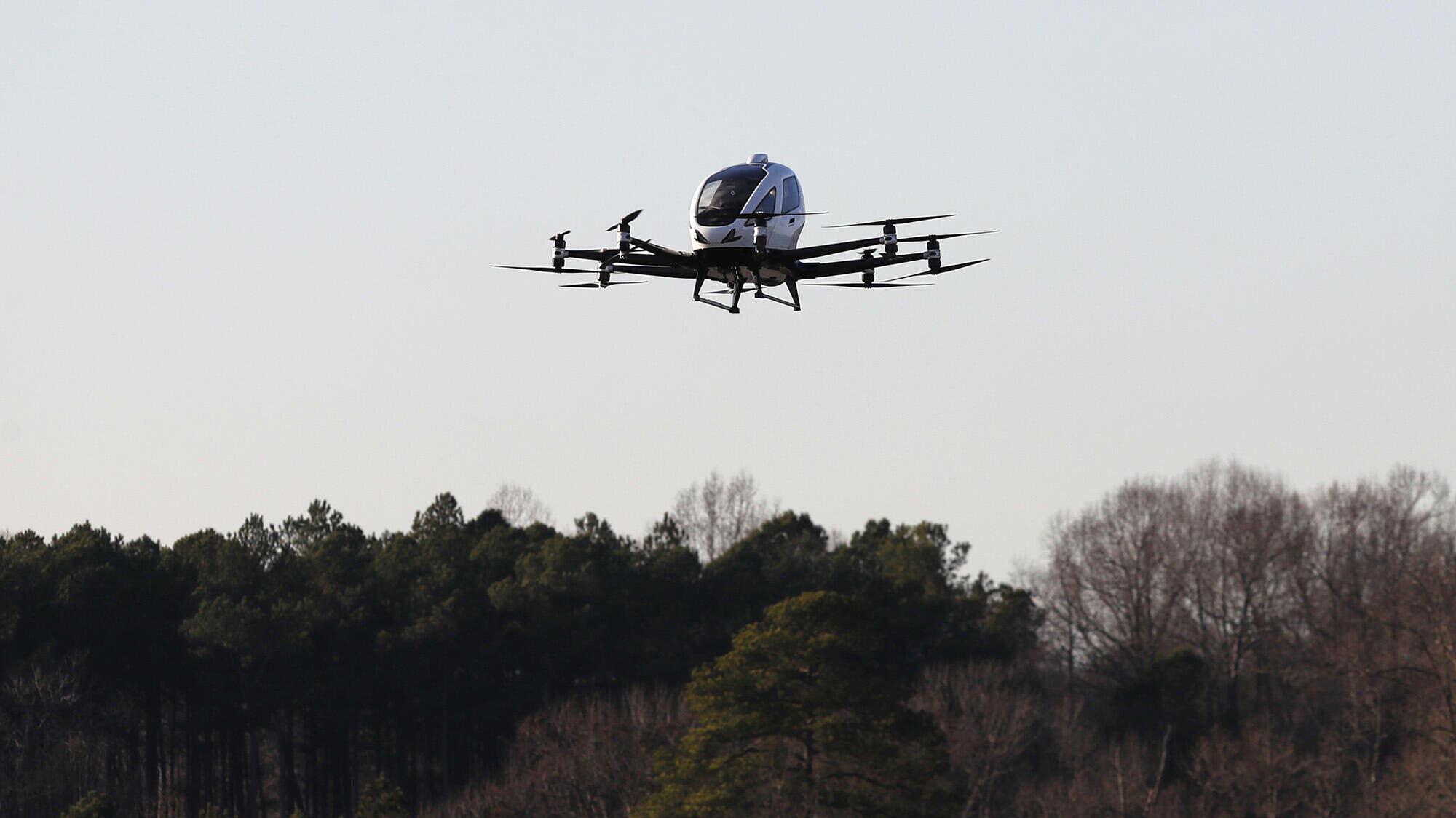
China takes another step toward commercial use of air taxis: Ehang (亿航), the South China-based manufacturer of autonomous flying passenger drones, has received type certification for a so-called eVTOL aircraft – nine years after the startup was founded in Guangzhou. The acronym stands for “Electric vertical take off and landing.” The certification applies to the EH-216 model.
EHang submitted the application in January 2021, followed by extensive testing by the Civil Aviation Administration of China (CAAC). Now, after a total of around 40,000 test flights, the aircraft can theoretically be used in everyday service. The manufacturer hopes that service test flights could commence before the end of the year. This makes the NYSE-listed company a global leader in urban air mobility (UAM) with unmanned aerial vehicles (UAVs). E-Hang’s Nasdaq stock price surged about 50 percent following news of the certification.
As early as last July, EHang signed a cooperation agreement with the southern Chinese metropolis of Shenzhen for the commercial deployment of eVTOLs in the Bao’an District. District Mayor Meng Jinjin plans to offer ten routes by the end of this year. However, whether this will work out so quickly remains to be seen. According to reports, a total of 50 routes with 100 landing platforms are already planned. Shenzhen’s Bao’an District, which has a population of 4.5 million, is also home to the Shenzhen International Airport, opposite Hong Kong.
According to the trade journal eVTOL News, EHang has already delivered five EH-216s to Shenzhen Boling Holding Group in September. Boling ordered up to 100 models, under the condition of certification, and plans to use them for air tourism and sightseeing services in cooperation with the Bao’an district government. At a later stage, the company also plans to offer flights to Hong Kong, Macau and the provincial capital Guangzhou, explains Boling Chairman Xu Guanshen.
Late last week, EHang also signed a contract with the Hefei municipal government, the capital of Anhui province, for 100 taxi drones. The 12.5 million city of Hefei will invest 100 million US dollars in developing the new industry. This is an important step for E-Hang, which has lost nearly one billion US dollars between 2020 and 2022 alone.
The EH-216 is a two-seater that can carry a payload of up to 260 kilograms, including passengers’ luggage. At 5.16 meters, its radius is about the same as the length of a BMW 5 Series. The aircraft currently costs around 300,000 US dollars. But this price is expected to fall as the number of units increases. With its 16 electric motors and an equal number of propellers, the EH-216 is considered very safe and easy to control autonomously. It is also very quiet compared to helicopters.
Its batteries allow the EH-216 to fly for 30 minutes at a top speed of 130 kilometers per hour within a radius of up to 35 kilometers. This makes it ideal for use in China’s megacities. However, top speed and maximum flight duration will be capped at 25 minutes and 100km/h for the time being.
A firefighting version of the EH-216 is also planned for the future, capable of fighting high-rise fires. An ambulance version is also planned, with space for a stretcher and a paramedic. EHang is also developing a four-seater version of the model.
Meanwhile, China is the first country in the world to work on the framework conditions for a green aerospace industry. The aim is to establish this industry by 2035. A first draft was presented last week, involving four ministries: the Ministry of Industry and Information Technology, the Ministry of Science and Technology, the Ministry of Finance and the Ministry of Aviation. Beijing has a strong interest in shifting some of the road traffic in the megacities to the air in order to relieve road congestion.
Autonomous flight is considered less complex than autonomous driving because comparatively fewer simultaneously moving objects need to be coordinated in the air. In 2022, the Ministry of Transport and the Ministry of Science have already encouraged the industry to develop in this direction. No other country is currently promoting the development of such an industry as much as China.
Other manufacturers also follow EHang’s example. XPeng, Volkswagen’s autonomous driving partner, received permission from China’s aviation regulator in January to test its model called the X2 with a pilot. The X2, also showcased in Dubai, resembles more a car than a helicopter in shape and uses eight rotors to fly.
There are now over 800 design concepts for electric VTOLS worldwide. A study by the investment bank Morgan Stanley predicts that the eVTOL market will be worth one trillion US dollars in 2040 and ten years later will already be worth nine trillion.
China has made the most headway, but in other regions of the world, not only traditional manufacturers like Airbus and Boeing are making steady progress. Startups such as Vertical Aerospace in England, SkyDrive in Japan and Volocopter in Germany are also gaining ground. Volocopter CEO Dirk Hoke initially hoped to obtain the first licensed eVTOL, but the Chinese were faster. Yet Volocopter and Aerofugia, a subsidiary of car manufacturer Geely, had already set up a joint venture in Chengdu in 2021 to launch Volocopter in China.
There are also air taxi startups in the United States. This month, Joby Aviation began test-flying a piloted air taxi prototype. In June, Klaus Loewe, CEO of the young company Lilium, signed a cooperation agreement with Shenzhen-based Eastern General Aviation Co, Ltd – also known as Heli-Eastern. According to the agreement, Heli-Eastern will order 100 Lilium e-jets. Simultaneously, Lilium established its Asia-Pacific headquarters in Shenzhen.
In 2019, Lilium’s five-seater electric air taxi successfully made its maiden flight in Germany. However, it does not yet have a commercial license in Europe or China. With its 36 electric jet engines, the aircraft is said to be able to travel 300 kilometers per hour for about an hour. Shenzhen-based IT and gaming group Tencent holds a stake in Lilium.
And even Volkswagen unveiled the “Flying Tiger” a year ago, a four-seater flying taxi developed by VW’s vertical mobility division. It is currently undergoing testing. The Germans will have to hurry up if they want to get in on this new trend.
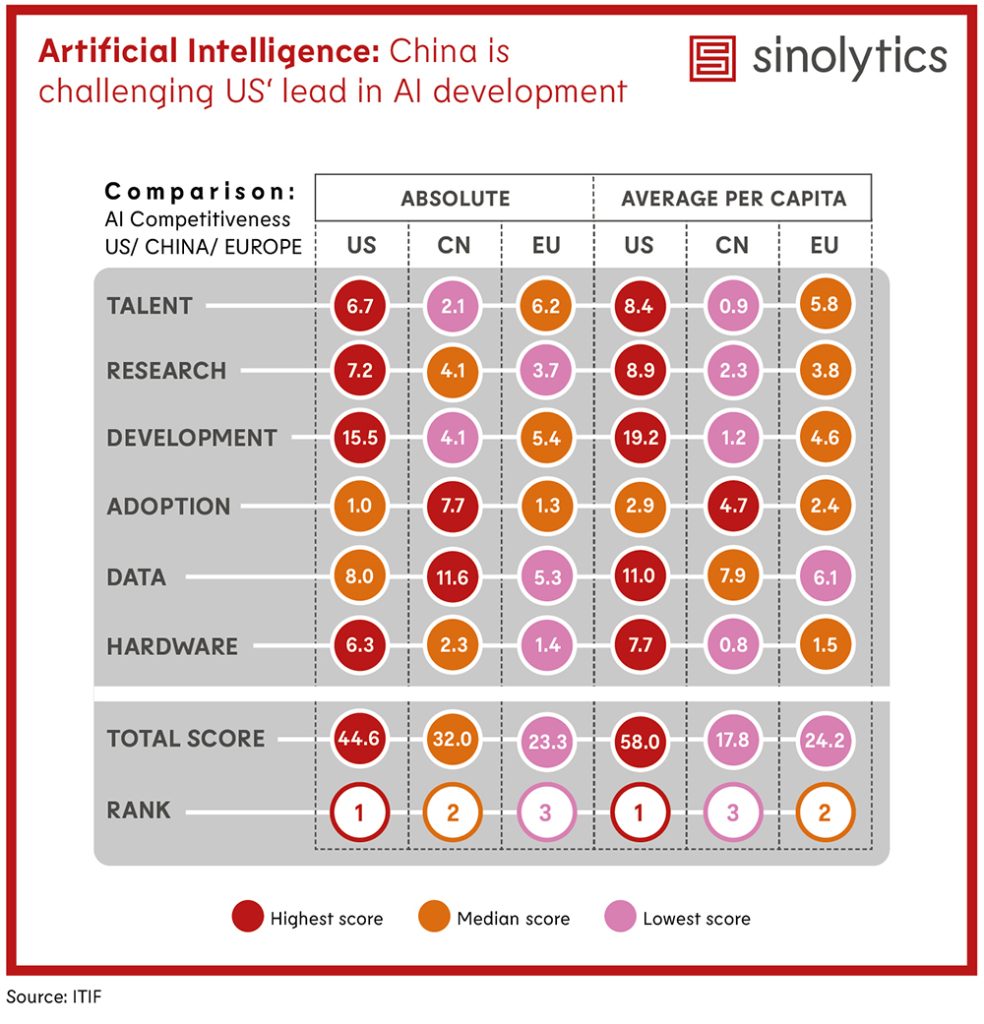
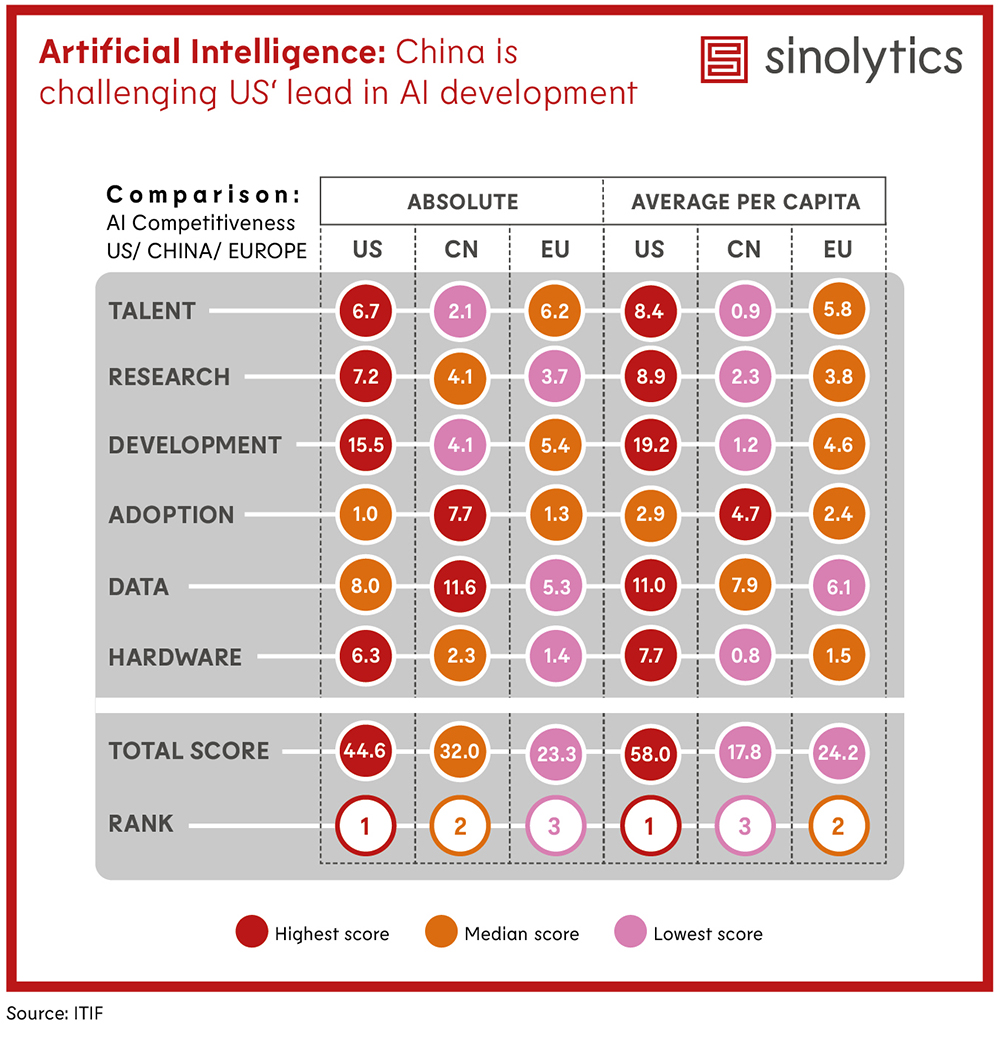
Sinolytics is a European research-based consultancy entirely focused on China. It advises European companies on their strategic orientation and concrete business activities in the People’s Republic.
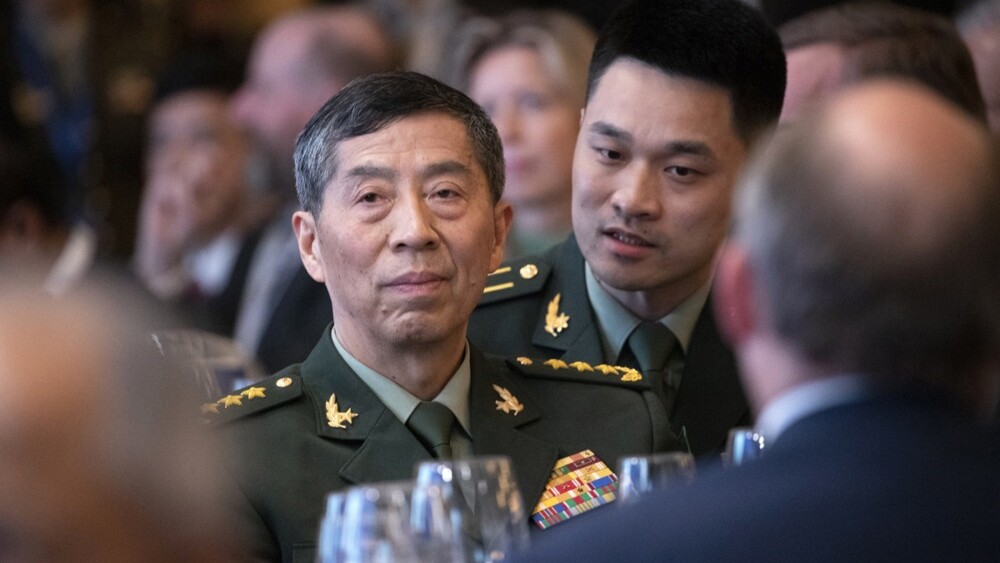
After having disappeared for about two months, Defense Minister Li Shangfu (李尚福) has been officially sacked. The Standing Committee of the National People’s Congress dismissed Li from his ministerial post and his position as state councilor, state broadcaster CCTV reported Tuesday. The already ousted foreign minister, Qin Gang, was also stripped of his post as state councilor. The news had been expected since Li disappeared from public view as abruptly at the end of August as Qin Gang previously.
Speculation has since circulated about corruption in the procurement of military equipment. Li headed the Central Military Commission’s Weapons Development Department from 2017 to 2022, also responsible for purchasing foreign weapons and military technology. Li has been sanctioned by the United States since 2018 for arms deals with Russia dating back to that time.
Li’s removal sparked a few snarky comments on social media. “The old timers were right: the fewer the words, the bigger the story” (字越少,事越大。古人诚不欺我), wrote one user on a Beijing Daily Newspaper Group news platform. However, the post was deleted a short time later.
Unlike Qin Gang – who was replaced by his predecessor Wang Yi – Beijing did not initially appoint a new defense minister. Two weeks ago, Reuters, citing five informed sources, had floated Chief of Staff Gen. Liu Zhenli as the most likely successor. The South China Morning Post also reported at the time, citing anonymous sources, that General Liu would attend the Xiangshan International Security Forum in Beijing in late October as a central figure. The paper took this as an indication that Liu could be a potential successor.
The Xiangshan Forum is a kind of Chinese Shangri-La security dialogue. A US delegation will attend it, the first time since the military dialogue was suspended in August 2022. If General Liu were the key contact for the US delegation there instead of the sanctioned ex-minister, it would undoubtedly make bilateral talks easier. ck
China’s Foreign Minister Wang Yi will travel to the United States later this week. According to officials in the United States, Wang will meet with his counterpart Antony Blinken and National Security Advisor Jake Sullivan in Washington. Starting Thursday local time, the meetings are expected to focus on the war in Gaza and preparations for a summit between US President Joe Biden and China’s leader Xi Jinping. The number of high-level contacts between the two superpowers is currently increasing again. Wang only met with Sullivan a few weeks ago in Malta, and Blinken met him in Beijing in the summer.
It was also revealed that Wang spoke on the phone with his counterparts in Israel and Palestine on Monday. “Every country has the right to self-defense but should abide by international humanitarian law and protect civilians,” Wang told Israeli counterpart Eli Cohen. China will do its utmost to contribute to Palestinian-Israeli reconciliation, he added.
In his phone call with Palestinian Foreign Minister Riyad al-Maliki, Wang stressed that China “deeply sympathizes with the plight of the Palestinian side, especially the people in Gaza.” He said his country will continue to provide humanitarian aid to the people of Gaza. The two phone calls represent China’s highest-level contact with Israel and Palestine since the Hamas terror attack on Oct. 7. China’s Middle East special envoy Zhai Jun is also traveling the region. So far, China has tended to side with the Palestinians, as have Arab states. ck/rtr
The EU Parliament’s Trade Committee has spoken out in favor of expanding trade relations with Taiwan. The MEPs also called on the EU Commission and the European External Action Service (EEAS) to “swiftly begin working on a resilient supply chain agreement with Taiwan.” The Committee set this out in a resolution that will also be voted on in the European Parliament’s plenary in November. Resolutions are positions on specific issues and are not legally binding.
In the text, MEPs also call on the Commission and the EEAS to step up their support to Taiwan and help it maintain a presence in multilateral and international forums. “We call for the further strengthening of the relationship, alongside concrete progress for key initiatives such as the Trade & Investment Dialogue,” said Romanian MEP Iuliu Winkler. The European Parliament has also proposed a bilateral investment agreement with Taiwan on several occasions – but the EU Commission has not made any concrete moves in this regard.
China considers Taiwan a secessionist province. The EU pursues a “one China” policy regarding Taiwan, which excludes official diplomatic relations with Taiwan while allowing bilateral economic ties to a certain extent.
On Tuesday, the EU Parliament’s Trade Committee also gave the green light for the planned free trade agreement with New Zealand. The Parliament is also to vote on this in November. With the approval of the EU Council, the deal could enter into force in mid-2024. The free trade agreement is an important step for cooperation with states in the Indo-Pacific region. ari
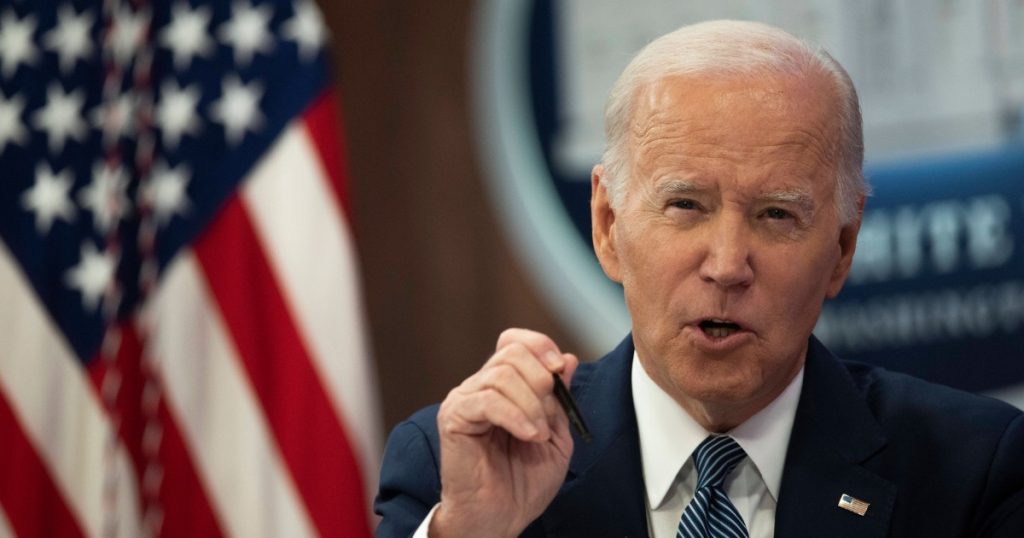
The European Union is concerned that the US government’s restrictions on foreign investment targeting China could also hit EU companies. According to Bloomberg, senior EU officials have clearly communicated this to their US counterparts, citing informed persons and obtained documents.
US President Joe Biden signed an executive order in August authorizing the US Treasury Secretary to ban US investment in Chinese companies involved in artificial intelligence, quantum computing and advanced semiconductors. The concern now is that this could also affect EU-based companies, with US investors on one side and Chinese owners on the other.
A spokeswoman for the US Department of the Treasury said the order was narrowly worded and focused on US national security interests. The EU did not immediately respond to a request for comment. cyb

When asked why May-Britt Stumbaum, a researcher at the Center for Intelligence and Security Studies (CISS) at the Bundeswehr University in Munich, is interested in security policy, she smiles: “I was always pretty good at math.” What Stumbaum alludes to: When she went to elementary school in the early 1980s, schoolchildren were required to participate in regular nuclear emergency evacuation drills. But with 1,200 students and only 100 seats in the fallout shelter, “it quickly became clear that not everyone would fit,” Stumbaum says. An impetus that, over time, developed into a fascination for politics and for the question that is still on her mind today: Why people make which decisions.
Stumbaum studied political science and European studies before joining the German Council on Foreign Relations (DGAP) from 2002 to 2008, where she was able to combine her interests in Asia – the newcomers on the world stage – and security policy for the first time. After her PhD, she moved on to Harvard for her postdoc, partly because until a few years ago, security policy aspects were difficult to incorporate into research in Europe. Since then, she has worked for several renowned think tanks and research groups and has now been active at the CISS since March 2023.
Unlike her parents, who were active in the peace movement, Stumbaum believes that soldiers are needed to keep the peace – in the hope that they will never be needed. That’s why she became a reserve lieutenant colonel in the German Air Force in 2012. On the one hand, to gain access to information and better understand decision-making processes in the German armed forces; on the other hand, to “effectively give something back to Germany for the many opportunities she has been given.”
Stumbaum believes you must prepare for war to prevent it, especially when facing the Chinese Communist Party, which emerged in an environment of violence. Moreover, “we urgently need to know more about China to make better decisions,” the security expert says. The point is by no means to justify the CCP’s policies – but to be able to understand Chinese decisions.
For example, China does not distinguish between civilian and military use of technology as we do in Germany, which is why the export of dual-use goods has to be closely examined, Stumbaum says. On the other hand, one must also clearly distinguish between the civilian population in China and the will of the CCP. Stumbaum aims to build up this expertise at her new post at the CISS, including intelligence studies and military war simulations. This will also be made available to German companies as business intelligence.
In the process, she says, it is important to define Germany’s interests from the outset and to abandon naiveté toward the CCP. Since 2012 at the latest – with the export restrictions on rare earths imposed by China on Japan and the publication of Document No. 9 the year after – it has become increasingly clear to Stumbaum that China poses under the CCP more threat than opportunity. Clemens Ruben
Lan Foan has been appointed China’s new Finance Minister. The 61-year-old succeeds Liu Kun, who had been finance minister since 2018. Previously, Lan was the party chief of the northern Chinese Shanxi province.
Yin Hejun was appointed Minister of Science and Technology. Chinese state media on Tuesday reported on the changes at the top of the two ministries.
Sun Guangyu was appointed Deputy Secretary General of the State Council last week after Wang Zhiqing was removed from the post. Previously, Sun was Vice Minister of emergency management.
Chen Min now holds the post of Vice Minister of Water Resources.
Is something changing in your organization? Let us know at heads@table.media!

Flickering 3D images in Bangkok: Hong Kong presents itself with an interactive exhibition called “Immersive Hong Kong” in Thailand’s capital. In this way, the city government wants to draw visitors from Thailand. Conversely, the tropical country is one of the most popular destinations for tourists from Hong Kong and mainland China.
When a new, possibly relevant political party forms, the China community naturally asks itself the question: How does this new faction perceive the People’s Republic? Finn Mayer-Kuckuk has looked at what the founders of the German “Alliance Sahra Wagenknecht” – BSW for short – have said about China so far.
What is clear: They want close economic cooperation with the People’s Republic; they consider turning away from business with China unrealistic or even harmful. Wagenknecht herself once directly praised Beijing’s industrial policy. In the Ukraine war, the BSW follows the Sino-Russian narrative, which sees the USA as the warmonger and the root of the escalation.
The sky may soon no longer be the limit in China’s southern metropolis of Shenzhen, and what will take you there is an electric two-seater – with no pilot at all. The company Ehang has received official certification for its first electric vertical take-off model called EH-216. It is the world’s first license of its kind, as Frank Sieren writes. The model has already received 100 orders and will soon be used as an air cab on a number of selected routes.


The newly-founded Alliance Sahra Wagenknecht (BSW) does not explicitly mention China in its founding manifesto. But China is at least indirectly mentioned in a similar context as Russia: “We reject the deployment of German soldiers in international wars as well as their stationing on the Russian border or in the South China Sea.”
The paper follows the Sino-Russian narrative, identifying US warmongering as the root of the current conflicts and portraying Germany and the EU as helpless followers of Washington. The alliance generally rejects sanctions.
The BSW aims to work toward an independent EU position: “Our goal is an independent Europe of sovereign democracies in a multipolar world and not a new bloc confrontation in which Europe is ground down between the United States and the increasingly self-confident new power bloc around China and Russia.”
The BSW’s worldview is in line with Beijing’s repeated recommendation that the EU should free itself from the grip of the USA. And go its own way – towards China, if possible. France’s President Emmanuel Macron has already expressed a similar view and received plenty of criticism from Berlin and Brussels.
However, it is also remarkable that the Wagenknecht Alliance recognizes that the “power bloc around China” is forming “increasingly self-confident.” This reflects reality, even if the BSW conclusion differs from the majority position in the German government. Instead of confrontation, the BSW seeks peace negotiations, “détente, reconciliation of interests, and international cooperation.” By its own admission, it sees itself in the tradition of the former chancellor of West Germany, Willy Brandt.
The project’s initiator, Sahra Wagenknecht, has expressed similar positions on China in the past. “As robust as the Chinese economy may be, trade relations with the East Asian country are fragile. There are dangers here, in particular, if Europe fails to make itself independent of the American economic wars,” she wrote three years ago.
Wagenknecht presents China as a model of successful economic policy during the pandemic: “Incidentally, the fact that China is the only major economy to grow this year has one central cause: A determined industrial policy and massive state investment.” So, Wagenknecht is a fan of industrial policy.
“BSW – Fuer Vernunft und Gerechtigkeit” (For Reason and Justice) is a spin-off from the German Left Party, which opposes taking in refugees and favors cheap Russian gas imports. The leading figure is the high-profile member of the German Bundestag Wagenknecht. So far, BSW is only a registered association, but there are plans to found a new party. The association’s chairwoman is Amira Mohamed Ali, a member of the Bundestag from Hamburg.
Mohamed Ali has also commented extensively on China. Her views are largely in line with Wagenknecht’s. Mohamed Ali also sees the growing relationship between China and Russia not as a positive development, but as a threat. “The danger of a powerful bloc consisting of Russia, China, India and Iran, which can marginalize the EU and the US economically and geopolitically, is growing.”

At the time, she praised Chancellor Olaf Scholz for seeking talks with Beijing to bring peace to Ukraine. In contrast, Mohamed Ali criticized the German Green Party on Twitter, saying, “If the Green anti-China course prevails, our economy will collapse further. Jobs disappear, purchasing power drops rapidly.”
However, the new BSW chairwoman also acknowledges that “China is not a democratic state. It is true that serious human rights violations are commonplace there.” However, she feels that Washington influences the German debate: “The reason why human rights violations in China are such an issue now is the fact that the competitive situation between the US and China has intensified in terms of who is or will become the world’s number one power.”
Mohamed Ali considers the values-driven policy of Green Foreign Minister Annalena Baerbock to be futile: “Anyone who believes that the human rights situation in China will improve by Europe sealing itself off from China is simply mistaken.” She firmly advocates good economic relations with China: “An economic war with China would have devastating consequences for our country. Countless jobs would be at risk. That is the wrong course.”
German MP Christian Leye, also one of the co-founders of BSW, has commented extensively on China recently. He is particularly keen to avoid a trade policy confrontation.

He noted that because of Germany’s heavy dependence on China, particularly for raw materials, it could not afford to be involved in a dispute. “We would be well advised to keep our hands off another economic war, this time with China,” Leye said last year. “Another trade conflict, this time tougher and worse than the one with Russia; the population will not go along with that; they can’t stand it, ladies and gentlemen.”
In June 2023, Leye submitted a minor interpellation to the German Bundestag, inquiring about the status of export guarantees for business with China. In response to the MP’s question, the Ministry of Economics stated that only a few projects were still guaranteed with small sums. Leye then criticized Economy Minister Robert Habeck, saying that his anti-China stance jeopardized Germany’s success.

China takes another step toward commercial use of air taxis: Ehang (亿航), the South China-based manufacturer of autonomous flying passenger drones, has received type certification for a so-called eVTOL aircraft – nine years after the startup was founded in Guangzhou. The acronym stands for “Electric vertical take off and landing.” The certification applies to the EH-216 model.
EHang submitted the application in January 2021, followed by extensive testing by the Civil Aviation Administration of China (CAAC). Now, after a total of around 40,000 test flights, the aircraft can theoretically be used in everyday service. The manufacturer hopes that service test flights could commence before the end of the year. This makes the NYSE-listed company a global leader in urban air mobility (UAM) with unmanned aerial vehicles (UAVs). E-Hang’s Nasdaq stock price surged about 50 percent following news of the certification.
As early as last July, EHang signed a cooperation agreement with the southern Chinese metropolis of Shenzhen for the commercial deployment of eVTOLs in the Bao’an District. District Mayor Meng Jinjin plans to offer ten routes by the end of this year. However, whether this will work out so quickly remains to be seen. According to reports, a total of 50 routes with 100 landing platforms are already planned. Shenzhen’s Bao’an District, which has a population of 4.5 million, is also home to the Shenzhen International Airport, opposite Hong Kong.
According to the trade journal eVTOL News, EHang has already delivered five EH-216s to Shenzhen Boling Holding Group in September. Boling ordered up to 100 models, under the condition of certification, and plans to use them for air tourism and sightseeing services in cooperation with the Bao’an district government. At a later stage, the company also plans to offer flights to Hong Kong, Macau and the provincial capital Guangzhou, explains Boling Chairman Xu Guanshen.
Late last week, EHang also signed a contract with the Hefei municipal government, the capital of Anhui province, for 100 taxi drones. The 12.5 million city of Hefei will invest 100 million US dollars in developing the new industry. This is an important step for E-Hang, which has lost nearly one billion US dollars between 2020 and 2022 alone.
The EH-216 is a two-seater that can carry a payload of up to 260 kilograms, including passengers’ luggage. At 5.16 meters, its radius is about the same as the length of a BMW 5 Series. The aircraft currently costs around 300,000 US dollars. But this price is expected to fall as the number of units increases. With its 16 electric motors and an equal number of propellers, the EH-216 is considered very safe and easy to control autonomously. It is also very quiet compared to helicopters.
Its batteries allow the EH-216 to fly for 30 minutes at a top speed of 130 kilometers per hour within a radius of up to 35 kilometers. This makes it ideal for use in China’s megacities. However, top speed and maximum flight duration will be capped at 25 minutes and 100km/h for the time being.
A firefighting version of the EH-216 is also planned for the future, capable of fighting high-rise fires. An ambulance version is also planned, with space for a stretcher and a paramedic. EHang is also developing a four-seater version of the model.
Meanwhile, China is the first country in the world to work on the framework conditions for a green aerospace industry. The aim is to establish this industry by 2035. A first draft was presented last week, involving four ministries: the Ministry of Industry and Information Technology, the Ministry of Science and Technology, the Ministry of Finance and the Ministry of Aviation. Beijing has a strong interest in shifting some of the road traffic in the megacities to the air in order to relieve road congestion.
Autonomous flight is considered less complex than autonomous driving because comparatively fewer simultaneously moving objects need to be coordinated in the air. In 2022, the Ministry of Transport and the Ministry of Science have already encouraged the industry to develop in this direction. No other country is currently promoting the development of such an industry as much as China.
Other manufacturers also follow EHang’s example. XPeng, Volkswagen’s autonomous driving partner, received permission from China’s aviation regulator in January to test its model called the X2 with a pilot. The X2, also showcased in Dubai, resembles more a car than a helicopter in shape and uses eight rotors to fly.
There are now over 800 design concepts for electric VTOLS worldwide. A study by the investment bank Morgan Stanley predicts that the eVTOL market will be worth one trillion US dollars in 2040 and ten years later will already be worth nine trillion.
China has made the most headway, but in other regions of the world, not only traditional manufacturers like Airbus and Boeing are making steady progress. Startups such as Vertical Aerospace in England, SkyDrive in Japan and Volocopter in Germany are also gaining ground. Volocopter CEO Dirk Hoke initially hoped to obtain the first licensed eVTOL, but the Chinese were faster. Yet Volocopter and Aerofugia, a subsidiary of car manufacturer Geely, had already set up a joint venture in Chengdu in 2021 to launch Volocopter in China.
There are also air taxi startups in the United States. This month, Joby Aviation began test-flying a piloted air taxi prototype. In June, Klaus Loewe, CEO of the young company Lilium, signed a cooperation agreement with Shenzhen-based Eastern General Aviation Co, Ltd – also known as Heli-Eastern. According to the agreement, Heli-Eastern will order 100 Lilium e-jets. Simultaneously, Lilium established its Asia-Pacific headquarters in Shenzhen.
In 2019, Lilium’s five-seater electric air taxi successfully made its maiden flight in Germany. However, it does not yet have a commercial license in Europe or China. With its 36 electric jet engines, the aircraft is said to be able to travel 300 kilometers per hour for about an hour. Shenzhen-based IT and gaming group Tencent holds a stake in Lilium.
And even Volkswagen unveiled the “Flying Tiger” a year ago, a four-seater flying taxi developed by VW’s vertical mobility division. It is currently undergoing testing. The Germans will have to hurry up if they want to get in on this new trend.


Sinolytics is a European research-based consultancy entirely focused on China. It advises European companies on their strategic orientation and concrete business activities in the People’s Republic.

After having disappeared for about two months, Defense Minister Li Shangfu (李尚福) has been officially sacked. The Standing Committee of the National People’s Congress dismissed Li from his ministerial post and his position as state councilor, state broadcaster CCTV reported Tuesday. The already ousted foreign minister, Qin Gang, was also stripped of his post as state councilor. The news had been expected since Li disappeared from public view as abruptly at the end of August as Qin Gang previously.
Speculation has since circulated about corruption in the procurement of military equipment. Li headed the Central Military Commission’s Weapons Development Department from 2017 to 2022, also responsible for purchasing foreign weapons and military technology. Li has been sanctioned by the United States since 2018 for arms deals with Russia dating back to that time.
Li’s removal sparked a few snarky comments on social media. “The old timers were right: the fewer the words, the bigger the story” (字越少,事越大。古人诚不欺我), wrote one user on a Beijing Daily Newspaper Group news platform. However, the post was deleted a short time later.
Unlike Qin Gang – who was replaced by his predecessor Wang Yi – Beijing did not initially appoint a new defense minister. Two weeks ago, Reuters, citing five informed sources, had floated Chief of Staff Gen. Liu Zhenli as the most likely successor. The South China Morning Post also reported at the time, citing anonymous sources, that General Liu would attend the Xiangshan International Security Forum in Beijing in late October as a central figure. The paper took this as an indication that Liu could be a potential successor.
The Xiangshan Forum is a kind of Chinese Shangri-La security dialogue. A US delegation will attend it, the first time since the military dialogue was suspended in August 2022. If General Liu were the key contact for the US delegation there instead of the sanctioned ex-minister, it would undoubtedly make bilateral talks easier. ck
China’s Foreign Minister Wang Yi will travel to the United States later this week. According to officials in the United States, Wang will meet with his counterpart Antony Blinken and National Security Advisor Jake Sullivan in Washington. Starting Thursday local time, the meetings are expected to focus on the war in Gaza and preparations for a summit between US President Joe Biden and China’s leader Xi Jinping. The number of high-level contacts between the two superpowers is currently increasing again. Wang only met with Sullivan a few weeks ago in Malta, and Blinken met him in Beijing in the summer.
It was also revealed that Wang spoke on the phone with his counterparts in Israel and Palestine on Monday. “Every country has the right to self-defense but should abide by international humanitarian law and protect civilians,” Wang told Israeli counterpart Eli Cohen. China will do its utmost to contribute to Palestinian-Israeli reconciliation, he added.
In his phone call with Palestinian Foreign Minister Riyad al-Maliki, Wang stressed that China “deeply sympathizes with the plight of the Palestinian side, especially the people in Gaza.” He said his country will continue to provide humanitarian aid to the people of Gaza. The two phone calls represent China’s highest-level contact with Israel and Palestine since the Hamas terror attack on Oct. 7. China’s Middle East special envoy Zhai Jun is also traveling the region. So far, China has tended to side with the Palestinians, as have Arab states. ck/rtr
The EU Parliament’s Trade Committee has spoken out in favor of expanding trade relations with Taiwan. The MEPs also called on the EU Commission and the European External Action Service (EEAS) to “swiftly begin working on a resilient supply chain agreement with Taiwan.” The Committee set this out in a resolution that will also be voted on in the European Parliament’s plenary in November. Resolutions are positions on specific issues and are not legally binding.
In the text, MEPs also call on the Commission and the EEAS to step up their support to Taiwan and help it maintain a presence in multilateral and international forums. “We call for the further strengthening of the relationship, alongside concrete progress for key initiatives such as the Trade & Investment Dialogue,” said Romanian MEP Iuliu Winkler. The European Parliament has also proposed a bilateral investment agreement with Taiwan on several occasions – but the EU Commission has not made any concrete moves in this regard.
China considers Taiwan a secessionist province. The EU pursues a “one China” policy regarding Taiwan, which excludes official diplomatic relations with Taiwan while allowing bilateral economic ties to a certain extent.
On Tuesday, the EU Parliament’s Trade Committee also gave the green light for the planned free trade agreement with New Zealand. The Parliament is also to vote on this in November. With the approval of the EU Council, the deal could enter into force in mid-2024. The free trade agreement is an important step for cooperation with states in the Indo-Pacific region. ari

The European Union is concerned that the US government’s restrictions on foreign investment targeting China could also hit EU companies. According to Bloomberg, senior EU officials have clearly communicated this to their US counterparts, citing informed persons and obtained documents.
US President Joe Biden signed an executive order in August authorizing the US Treasury Secretary to ban US investment in Chinese companies involved in artificial intelligence, quantum computing and advanced semiconductors. The concern now is that this could also affect EU-based companies, with US investors on one side and Chinese owners on the other.
A spokeswoman for the US Department of the Treasury said the order was narrowly worded and focused on US national security interests. The EU did not immediately respond to a request for comment. cyb

When asked why May-Britt Stumbaum, a researcher at the Center for Intelligence and Security Studies (CISS) at the Bundeswehr University in Munich, is interested in security policy, she smiles: “I was always pretty good at math.” What Stumbaum alludes to: When she went to elementary school in the early 1980s, schoolchildren were required to participate in regular nuclear emergency evacuation drills. But with 1,200 students and only 100 seats in the fallout shelter, “it quickly became clear that not everyone would fit,” Stumbaum says. An impetus that, over time, developed into a fascination for politics and for the question that is still on her mind today: Why people make which decisions.
Stumbaum studied political science and European studies before joining the German Council on Foreign Relations (DGAP) from 2002 to 2008, where she was able to combine her interests in Asia – the newcomers on the world stage – and security policy for the first time. After her PhD, she moved on to Harvard for her postdoc, partly because until a few years ago, security policy aspects were difficult to incorporate into research in Europe. Since then, she has worked for several renowned think tanks and research groups and has now been active at the CISS since March 2023.
Unlike her parents, who were active in the peace movement, Stumbaum believes that soldiers are needed to keep the peace – in the hope that they will never be needed. That’s why she became a reserve lieutenant colonel in the German Air Force in 2012. On the one hand, to gain access to information and better understand decision-making processes in the German armed forces; on the other hand, to “effectively give something back to Germany for the many opportunities she has been given.”
Stumbaum believes you must prepare for war to prevent it, especially when facing the Chinese Communist Party, which emerged in an environment of violence. Moreover, “we urgently need to know more about China to make better decisions,” the security expert says. The point is by no means to justify the CCP’s policies – but to be able to understand Chinese decisions.
For example, China does not distinguish between civilian and military use of technology as we do in Germany, which is why the export of dual-use goods has to be closely examined, Stumbaum says. On the other hand, one must also clearly distinguish between the civilian population in China and the will of the CCP. Stumbaum aims to build up this expertise at her new post at the CISS, including intelligence studies and military war simulations. This will also be made available to German companies as business intelligence.
In the process, she says, it is important to define Germany’s interests from the outset and to abandon naiveté toward the CCP. Since 2012 at the latest – with the export restrictions on rare earths imposed by China on Japan and the publication of Document No. 9 the year after – it has become increasingly clear to Stumbaum that China poses under the CCP more threat than opportunity. Clemens Ruben
Lan Foan has been appointed China’s new Finance Minister. The 61-year-old succeeds Liu Kun, who had been finance minister since 2018. Previously, Lan was the party chief of the northern Chinese Shanxi province.
Yin Hejun was appointed Minister of Science and Technology. Chinese state media on Tuesday reported on the changes at the top of the two ministries.
Sun Guangyu was appointed Deputy Secretary General of the State Council last week after Wang Zhiqing was removed from the post. Previously, Sun was Vice Minister of emergency management.
Chen Min now holds the post of Vice Minister of Water Resources.
Is something changing in your organization? Let us know at heads@table.media!

Flickering 3D images in Bangkok: Hong Kong presents itself with an interactive exhibition called “Immersive Hong Kong” in Thailand’s capital. In this way, the city government wants to draw visitors from Thailand. Conversely, the tropical country is one of the most popular destinations for tourists from Hong Kong and mainland China.
